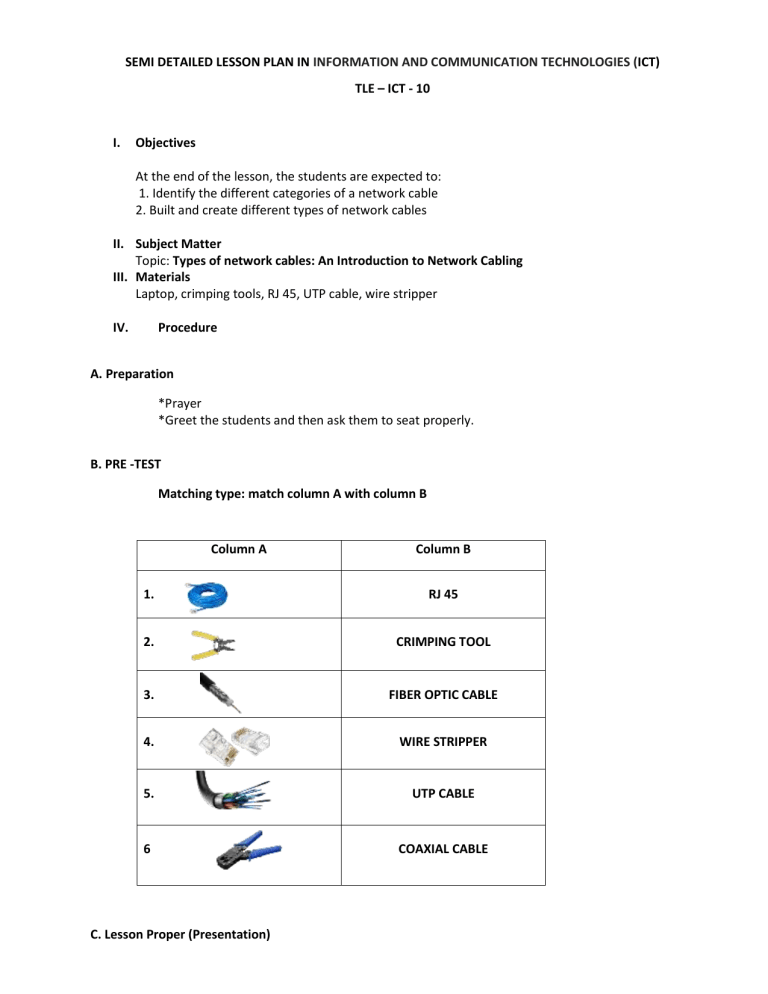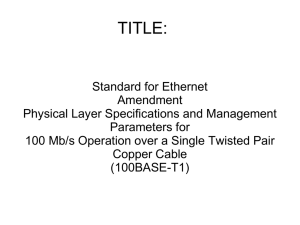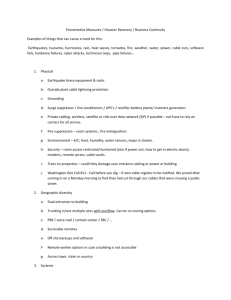
SEMI DETAILED LESSON PLAN IN INFORMATION AND COMMUNICATION TECHNOLOGIES (ICT) TLE – ICT - 10 I. Objectives At the end of the lesson, the students are expected to: 1. Identify the different categories of a network cable 2. Built and create different types of network cables II. Subject Matter Topic: Types of network cables: An Introduction to Network Cabling III. Materials Laptop, crimping tools, RJ 45, UTP cable, wire stripper IV. Procedure A. Preparation *Prayer *Greet the students and then ask them to seat properly. B. PRE -TEST Matching type: match column A with column B Column A Column B 1. RJ 45 2. CRIMPING TOOL 3. FIBER OPTIC CABLE 4. WIRE STRIPPER 5. UTP CABLE 6 COAXIAL CABLE C. Lesson Proper (Presentation) LESSON: Types of network cables: An Introduction to Network Cabling Development of new network cable technology Ethernet was developed in the mid-1970s by Robert Metcalfe and David Boggs at Xerox Corp. at its Palo Alto Research Center in California. In 1979, DEC and Intel joined forces with Xerox to standardize the Ethernet system. The first specification by the three companies, called the Ethernet Blue Book, was released in 1980; it was also known as the DIX standard after the company's initials. CABLES 1. Unshielded twisted pair Unshielded Twisted Pair (UTP) is a set of three or four pairs of wires with each wire in each pair twisted around the other to prevent electromagnetic interference. UTP cabling uses RJ-45, RJ-11, RS- 232, and RS449 connectors.. Coaxial Cable Coaxial cable is braided-grounded strands of wire that can provide some shielding and noise immunity; however, the installation and the termination of the cable itself can be costly. Coaxial cabling, which uses connectors called BNC (Bayonet Nut Connector) is known as, in forms of Ethernet, thicknet and thinnet, in the older LAN technology, ARCnet, and cable TV. Fiber Optic Fiber optic cabling carries signals, which have been converted from electrical to optical (pulses of light) form. It consists of the core, either an extremely thin cylinder of glass or optical quality plastic, which is surrounded by a second glass or plastic layer called the cladding. Shielded Twisted Pair (STP) Shielded Twisted Pair (STP), like UTP, also has four pairs of wires with each wire in each pair twisted together. However, the difference is that STP is surrounded with a foil shield and copper braided around the wires that allows more protection from any external electromagnetic interference. Activity/Application: CREATE STRAIGHT THROUGH AND CROSSOVER CABLE D.Generalization A computer network is a group of two or more computers connected with each other for sharing resources and information. Network devices are required for communication and interaction between hardware on a computer network. The uses and benefits of a computer network are file sharing like the users to share data files; hardware sharing like users can share devices such as printers; and user communication like using e-mail, chat, video conferencing. E. Evaluation A. IDENTIFICATION Direction: the Precautions and Procedures write TRUE if the statement is correct and FALSE if the statement is wrong. _________ 1. Anyone can perform a planned installation as long as he knows it. _________ 2. The Department of Education, Culture and Sports facilitates the competency assessment for computer technicians. __________3. Computer Technicians are given the TESDA NC II Computer System Servicing by TESDA after successfully taking the Assessment. _________ 4. Computer Technicians need not to have strong oral communication skills for they only repair computers. __________5. Companies prefer candidates with previous PC repair experience and they may look for candidates with experience repairing specific brands of computers. __________6. A job order is an external document by a project based Business. __________7. A job order can be the equivalent to a work or service order where the job order records the location, date and time the service is carried out and the nature of service that was carried out. Presented By Richard A. Sugbo Jr.

